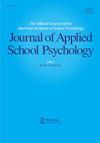比较一般结果和特定子技能掌握测量的边坡稳定性和有效性
IF 1.5
Q4 PSYCHOLOGY, EDUCATIONAL
引用次数: 1
摘要
进度监测数据是对困难学习者加强干预做出明智决策的核心。基于课程的口语阅读流利度(CBM-R)测量的一般结果测量(GOM)被发现与高风险评估相关;然而,数据变化很大,因此必须在实施干预措施15周后做出决定。最近的研究人员建议同时使用GOM和特定子技能掌握测量(SSMM)来克服单独使用GOM所带来的挑战,但对这种方法有效性的研究有限。利用贝叶斯和普通最小二乘回归,我们比较了CBM-R的GOM和SSMM斜率在第5、7和12周时每周每分钟正确阅读单词(wcpm)的斜率,并探讨了各自的斜率与随后接受单词阅读干预的高年级小学生标准化评估工具的关系。我们发现SSMM的斜率与之前的研究相似(即β = 1.46 wcpm / week)。这个斜率是显著的,并且与未来各个时间点的标准化评估结果有关。CBM-R的斜率不显著,也与未来的评估结果无关。讨论了对研究和实践的启示。本文章由计算机程序翻译,如有差异,请以英文原文为准。
Comparing Slope Stability and Validity for General Outcome and Specific Subskill Mastery Measurement
Abstract Progress monitoring data are central to making informed decisions on intervention intensification for struggling learners. The general outcome measure (GOM) of curriculum-based measurement of oral reading fluency (CBM-R) has been found to correlate with high-stakes assessment; however, data are highly variable, resulting in decisions that must be made 15 weeks after implementation of intervention. Recent researchers have recommended the use of both GOM and specific subskill mastery measurement (SSMM) to overcome the challenges presented with the use of GOM alone, but research on the efficacy of this approach is limited. Using Bayesian and ordinary least squares regression, we compared the GOM of CBM-R with SSMM slopes for words read correctly per minute (wcpm) per week at 5, 7, and 12 weeks, and explored the relation of the respective slopes with subsequent standardized assessment tools for struggling upper elementary students receiving word reading intervention. We found that the SSMM had a similar slope to that noted in prior research (i.e., β = 1.46 wcpm per week). This slope was significant and related to future standardized assessment outcomes across the various time points. The slope for CBM-R was not significant or related to future assessment outcomes. Implications for research and practice are discussed.
求助全文
通过发布文献求助,成功后即可免费获取论文全文。
去求助
来源期刊

Journal of Applied School Psychology
PSYCHOLOGY, EDUCATIONAL-
CiteScore
2.40
自引率
10.00%
发文量
7
期刊介绍:
With a new publisher (Taylor & Francis) and a new editor (David L. Wodrich), the Journal of Applied School Psychology will continue to publish articles and periodic thematic issues in 2009. Each submission should rest on either solid theoretical or empirical support and provide information that can be used in applied school settings, related educational systems, or community locations in which practitioners work. Manuscripts appropriate for publication in the journal will reflect psychological applications that pertain to individual students, groups of students, teachers, parents, and administrators. The journal also seeks, over time, novel and creative ways in which to disseminate information about practically sound and empirically supported school psychology practice.
 求助内容:
求助内容: 应助结果提醒方式:
应助结果提醒方式:


